

Call for case studies on dementia-friendly museums. The Museums Association (MA) is seeking case studies on dementia-related museum practice to be presented as evidence to a government-funded programme that aims to identify and support dementia-friendly communities.
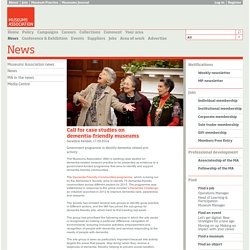
The Dementia Friendly Communities programme, which is being run by the Alzheimer's Society, aims to identify 75 dementia-friendly communities across different sectors by 2015. The programme was established in response to the prime minister’s Dementia Challenge, an initiative launched in 2012 to improve dementia care, awareness and research. The society has enlisted several sub-groups to identify good practice in different sectors, and the MA has joined the sub-group for dementia friendly arts, which held its first meeting last week.
The arts group is seen as particularly important because arts activity targets the areas that people ‘stop doing’ when they receive a diagnosis of dementia, thereby helping to prevent social isolation. LinksCase study template (word) Dementia friendly communities. Creating dementia friendly communities People with dementia and their carers talk about the everyday challenges they face in living well with dementia.
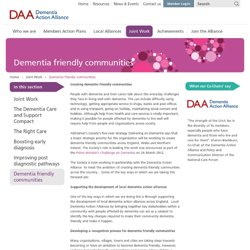
This can include difficulty using technology, getting appropriate service in shops, banks and post offices and in using transport, going on holiday, maintaining social contact and hobbies. Although help from health and care services is vitally important, making it possible for people affected by dementia to live well will require help from people and organisations across society. Alzheimer's Society's five year strategy Delivering on Dementia says that a major strategic priority for the organisation will be working to create dementia friendly communities across England, Wales and Northern Ireland.
The Society's role in leading this work was announced as part of the Prime Minister's Challenge on Dementia on 26 March 2012. Humanitas Foundation. Welkom op de website van Stichting Humanitas en Stichting Humanitas Huisvesting .

Stichting Humanitas is actief in Rotterdam, Spijkenisse en Capelle aan den IJssel op het gebied van zorg, welzijn, huisvesting en dienstverlening. Humanitas onderscheidt zich van andere zorgaanbieders en welzijnsinstellingen door haar aanpak, haar benadering van cliënten, de werkwijze van haar personeel en de inrichting van haar gebouwen. Dat betekent o.a. dat wij uitgaan van de volgende de kernwaarden: de cliënten behouden zo lang mogelijk de eigen regie over hun leven, Humanitas helpt hen daarbij als men dat wil en waar dat kan, de eigen werkzaamheid van cliënten is zeer belangrijk, de ja-cultuur. Humanitas kent een traditie van ‘zeer veel moet mogelijk zijn’ en ‘probeer alles en behoud het goede’, cliënten, medewerkers, familie, mantelzorgers en vrijwilligers zijn elkaars gelijke, ze gaan met elkaar om als een uitgebreide familie. Bent u op zoek naar het inlogscherm van ‘Zorg in Zicht’ klik dan hier . What makes a good place to grow old? As the population of older people grows, there will be a significant increase in the number of those suffering with some form of dementia.
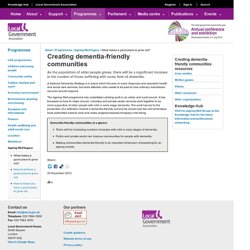
A National Dementia Strategy is in place which focuses on early diagnosis and specialist health and social care services, but more attention also needs to be paid to how ordinary mainstream services should respond. The Ageing Well programme has undertaken piloting work in an urban and rural council. On the road to dementia-friendly community. About us - Shared Lives Plus - Shared Lives, Small Community Services. Shared Lives Plus is the UK network for family-based and small-scale ways of supporting adults.

Our members are Shared Lives carers and workers, Homeshare programmes and micro-enterprises. Shared Lives used to be known as Adult Placement. Our members are individual Shared Lives carers, Shared Lives schemes, Homeshare providers and micro-enterprises. Go4Life (Elder Exercise) Neighbourhoods - Design - Browse by topic - Learn and Improve - Housing LIN.
Www.housinglin.org.uk/_library/Resources/Housing/Practice_examples/Housing_LIN_case_studies/HLIN_CaseStudy63_AgeFriendly_Wythenshawe.pdf. Www.who.int/ageing/publications/Age_friendly_cities_checklist.pdf. Making Stirling a Dementia Friendly City. We believe that being a “dementia friendly city” is not a one off project that can be completed and signed off. It isn’t a badge that can be awarded, or withheld by any organisation or government. It’s more like a journey. Nor does being dementia friendly amount to a list of qualifications that you can pass or fail. It’s not a matter of ticking boxes. It is more about saying to people with dementia, their carers, and everyone who lives in or uses the city that this is a place where we feel a certain way about dementia. What makes a good place to grow old? Programmes Home / Programmes / Ageing Well legacy / What makes a good place to grow old?
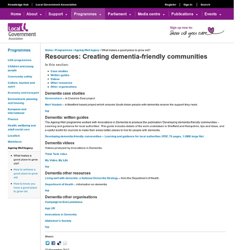
Resources: Creating dementia-friendly communities In this section: Dementia action alliance Homepage - Telephone: Plymouth plays key role in PM drive to create dementia friendly communities. "The Prime Minister’s Dementia Challenge needs to continue and be sustainable because we can’t let down people with dementia and their carers.
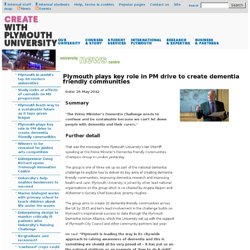
" That was the message from Plymouth University’s Ian Sherriff speaking at the Prime Minister’s Dementia Friendly Communities Champion Group in London yesterday. The group is one of three set up as part of the national dementia challenge to explore how to deliver its key aims of creating dementia friendly communities, improving dementia research and improving health and care. Plymouth University is joined by other lead national organisations on the group which is co-chaired by Angela Rippon and Alzheimer’s Society Chief Executive, Jeremy Hughes.
Ian said: “Plymouth is leading the way in its city-wide approach to raising awareness of dementia and this is something we should all be very proud of – it has put us on the national platform as an example of ‘how to do it right’. Dementia friendly communities. Dementia friendly communities involve groups of people who are working together to promote living well with dementia. This can be people living in villages or cities and working together in organisations. SILK: Dementia Friendly Communities. SILK are in the early stages of a project looking into what a ‘Dementia Friendly Community’ might look like in Kent.

This work will build on the Kent Dementia Co-production project we have been working on for the past year on behalf of KCC’s Head of Strategic Commissioning - Community Support, Emma Hanson. We have already been speaking to Kent residents about the dementia care pathway and have started working on opportunities to improve experiences, Dementia Friendly Communities is a natural progression which will involve the wider community and the contribution they can make. We have been doing research into other communities in the UK who have started the journey to becoming dementia friendly and have also been looking further afield to communities outside of the UK to build a picture of the different approaches taken.
We are arranging to visit these communities hopefully alongside some of the people living with dementia and carers we have worked with over the past year. Www.housinglin.org.uk/_library/Resources/Housing/Support_materials/Viewpoints/Viewpoint25_Dementia_Friendly_Communities.pdf. National Federation of Womenʼs Institutes - Dementia Friendly Communities. In March 2012 the Prime Minister set out his challenge on dementia and commitment to deliver improvements in care and research by 2015.
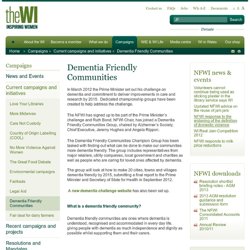
Dedicated championship groups have been created to help address the challenge. The NFWI has signed up to be part of the Prime Minister's challenge and Ruth Bond, NFWI Chair, has joined a Dementia Friendly Communities Group, chaired by Alzheimer's Society, Chief Executive, Jeremy Hughes and Angela Rippon. Making dementia-friendly cities. The Joseph Rowntree Foundation's report Dementia Without Walls looks at how to change perceptions around people with dementia. Photograph: Timothy Fadek Dementia creeps up on you.
It's not like having a fall, where one day you're OK and the next you're not. It took a long time to get my diagnosis. Then the doctor said: "I think Peter's got an early-onset dementia". But the biggest obstacle is people's attitude. Dementia friendly communities. The dementia friendly communities programme focuses on improving the inclusion and quality of life of people with dementia .
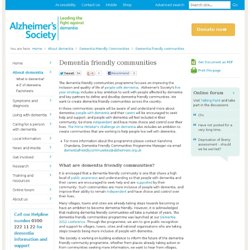
Alzheimer's Society's five year strategy includes a key ambition to work with people affected by dementia and key partners to define and develop dementia friendly communities. We want to create dementia friendly communities across the country. Dementia Friendly Community - Helmsdale.org. Portgower bowler to represent the Highlands Launch of a free family carers learning programme on Tuesday Jan 22nd 2pm at Helmsdale & District Community Centre.
Come and see what it is all about. Meet the team and enjoy some refreshments. There will be a couple of short talks, short film and information about the carer’s programme. The 3-month programme begins February 5th, and is a learning course for people who care for a family relative or neighbour with dementia (or other long-term condition that affects memory or behaviour). Family and community carers are among the unsung heroes of society. Based on several years practice research, a professional care and arts backgrounds, the course is fun and informative. Innovations in dementia - innovative project - ipeople with dementia have active roles to play in the communities in which they live. Philly Hare of Joseph Rowntree Foundation. Our project ‘ York Dementia without Walls’ has highlighted the great scope for supporting local communities, organisations and businesses to become more aware and understanding of dementia, and more inclusive.
The report published onthe 4 October suggests a number of ways forward: Increasing awareness of dementia and changing our attitude towards it can help to remove the stigma many people feel. This may help people to talk about their experience, to engage more in society and to ask for the help they need. Creating a dementia-friendly York. Janet Crampton, Janet Dean and Ruth Eley 4 October 2012.